QuestionQUESTION: We retired our best cutting mare and bred her. She is 11 years old and is 5 months in foal. She is in good condition but was not worked much the last few years due to leg problems. She is 14 hands 3 inches and weighs approximately 1000 lbs. Her only bad habit has been rubbing the fence until she breaks boards - especially with the tail/buttock area. We've had several vets check her with various tests and found no problems. The last one finally allergy tested and found her allergic to oats (269), molasses (242), rice bran (235), corn (236). She is borderline for barley (185). Tested ok for alfalfa (111), cottonseed (107), milo (116), pasture mix (107), soybean (119), wheat (106), and beet pulp (112). The test was called Spot Report by Spectrum Group of Spectrum Labs. 0-149 indicated negative, 150 - 199 indicated borderline, 200-399 indicated a positive reaction.
We now have her on alfalfa and pasture mix and she has improved a lot...still itches tail some. Still looks good.
We feel that she needs some grain as she gets further along in her pregency and during lactation.
Vet that did allergy testing said to talk to folks at feed mill but they seem stumped. Someone suggested alfalfa cubes and beet pulp with a vitamin/mineral supplement. We know how to feed cubes but not beet pulp nor where to find it. And, what kind of vitamin/mineral supplement and how much.
What do you think? I believe our resources do not have a strong background in equine nutrition. Want to be sure mare is well cared for and foal gets a good start. Thanks for you help. Judy
ANSWER: Dear Judy,
So if I understand your vets thinking they believe the scratching is due to some sort of allergy? What where you feeding your mare until the recent change? What feeds do you have readily available to you? And where are you located? Beet pulp shouldn't be hard to find and is great feed for horses. The trick will be to find unmolassed beet pulp or you will have to rinse the molasses off. You will be able to provide plenty of energy and protein feeding this and alfalfa my biggest concern is the mineral profile in alfalfa, mainly the very high levels of calcium which may impact bone development. So a mineral supplement for horses fed mostly alfalfa would be important, for example select the best's Select I. Did the vet test some sort of grass hay?
I commend you on wanting the best for your foal and realizing that this starts now with what you feed during pregnancy. If you can get back to me with the answers to my questions I'm see if I can come up with an easy solution.
Best wishes,
Clair
Clair Thunes, PhD
Independent Equine Nutritionist
Equilibrate Equine Consulting
info@equilibrateequine.com
www.equilibrateequine.com
---------- FOLLOW-UP ----------
QUESTION: Thanks, Clair, for the speedy response.
Vets think scratching was due to the food allergy as they tested/checked for lots of other possible sources (all negative, and she did improve when the listed allergens were removed from her diet. Did not test our hay (alfalfa). She still rubs her tail some which concerns us but not nearly like she was doing. She would leave grazing to rub tail/buttock until she popped the wooden boards. So, it is much better.
We were feeding her a sweet feed mix from the local mill called Pro Horse Show Conditioner for Equine with approx 50% barley, approx 50% oats plus molasses, soybean meal, processed canola meal, linseed meal, calcium carbonate, wheat middlings, dehydrated alfalfa meal, dicalcium phosphate, dried whey, magnesium oxide, salt, zinc oxide, maganese oxide, coper sulfate, ferrus sulfate, magnesium amino acid chelate, potassium amino acide complex, zinc amino acide chelate, magnanese amino acide chela, copper amino acide chelate, cobalt sulfate, dosium selenite, ethyelendiamine dihydriodide, DL-alpha tocopheryl acetate (vitamin E source), vitamin A supplement, D-activated animal sterol (souce of Vitamin D3), vitamin B12 supplement, riboflavin supplement, calicum panthothenate, thiamine monotrate, choline chlorida, artificial flavors, proplonic acid, acetic acid, benzoic acid and mineral oil.
Crude protein - 11%
Crude fat - 2.75%
Crude fiber - 10%
Calicum - .5 to .7%
Phosphorus - .35%
Salt - .15 to .3%
Magnesium - .15%
Potassium - .6%
Zinc - 45 ppm
Iron - 60 ppm
Magnesese - 35 ppm
Copper - 10 ppm
Iodine - .15ppm
Selenium - .3 ppm
Vit A - 2,400 IIU/lb
Vit D3 - 400 IU/lb
Vit E - 3 IU/lb
We have the one local feed mill and Purina Feeds and Kent are easily available in our area. We use the mill and they've been at a loss to help us. Of course, they specialize in show cattle and hogs. We just called the feed mill and they said they can get us beet pulp w/o molasses. He thought we might mix it with alfalfa pellets. If so, how should we feed it including amounts, mix, etc?
We live in south central Indiana and horse services are not easily available. When we have a severe injury, we go to Lexington and use the throughobred vets for our cutting horses (quarter horses). So, not sure if local advice is right.
Remember, due to her food allergies, she'e only getting alfalfa and pasture now. Also, please tell us more about the too high calicum possibility in alfalfa - thought calicum was good. Best supplements/amounts for us?
Thanks for any help you can give us.
Judy
AnswerDear Judy,
Sorry for the delayed response, I hope you had a good Thanks Giving. So the the missed feed you are feeding has molasses in it and oats so that may be why you are still seeing the rubbing. Right now your mare needs to be fed as normal she does not need extra calories until her 3rd trimester. Assuming she is in good weight she needs 2% of her body weight (and never less than 1.5%) as roughage. So that would be 20lbs and possibly up to 30lb depending on her condition. Beet pulp has more energy than hay about twice as much and can be fed up to 50% of the roughage intake. So you can feed all 20lbs as alfalfa or subsidize up to 10lbs as beet pulp. You weight the beet pulp dry and then soak it in water preferably over night and then feed it wet. You need to add about 2 times more water than beet pulp by volume.
The calcium is good but it needs to be in balance with phosphorous to be absorbed properly and be used by the body correctly. Similar balance issues exist for zinc, copper, iron and manganese. Copper is important for cartilage development and good copper in the mare has been shown to help reduce incidents of OCD in foals. I can't tell you what exact supplement to feed without doing an actual diet evaluation which is beyond the scope of what I can do here but I would be happy to discuss it further with you if you would like to email me at info@equilibrateequine.com you can learn more about what I do at my website www.equilibrateequine.com
Otherwise a supplement like Select the Bests Select I should help balance the diet and they have a supplement you add to it for brood mares. Once she gets to her 3rd trimester she will need more calories as that is when the foal is growing the fastest but this should be possible to do using beet pulp.
Kind regards,
Clair

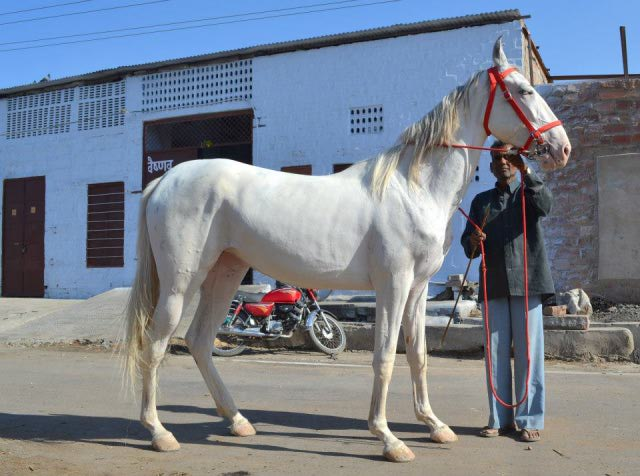 strong or weak
Question
strong or weak
hello maam, how this hor
strong or weak
Question
strong or weak
hello maam, how this hor
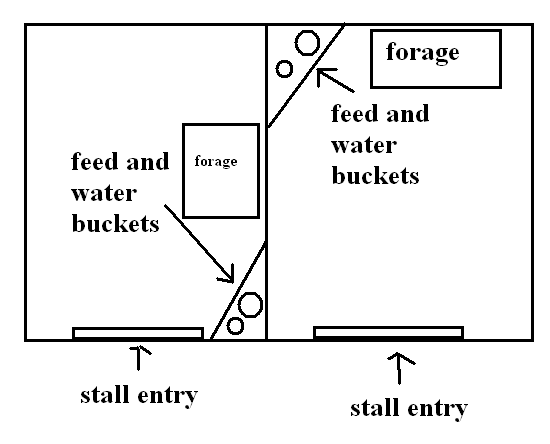 position for feed box, water bucket in the stall
Question
position for feed box,
hello, where should the
position for feed box, water bucket in the stall
Question
position for feed box,
hello, where should the
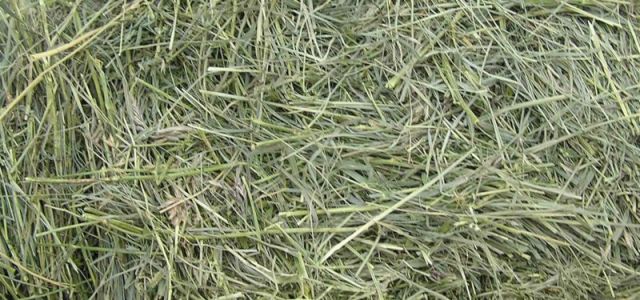 grass hay
Questionhello sir, what is grass hay? is it a type of h
grass hay
Questionhello sir, what is grass hay? is it a type of h
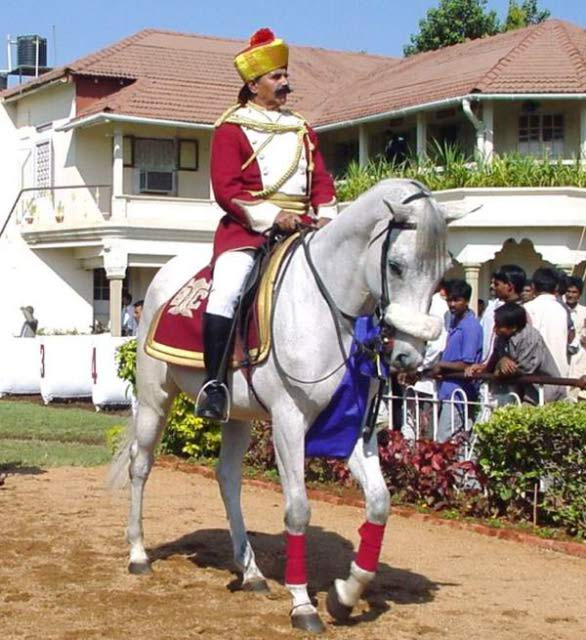 horse appearing fat
Question
horse appearing fat
hello maam, is this
horse appearing fat
Question
horse appearing fat
hello maam, is this
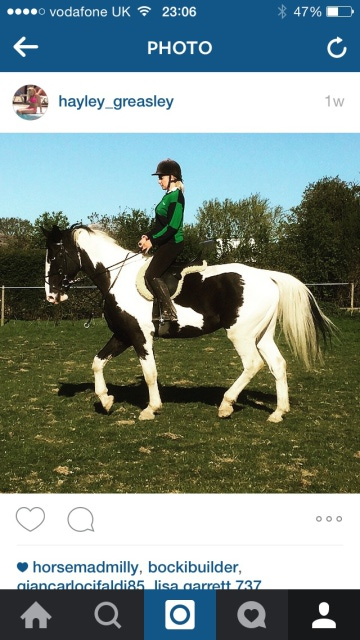 Feeding
Question
Cisco
I have a 17.2 Dutch warmblood who
Feeding
Question
Cisco
I have a 17.2 Dutch warmblood who